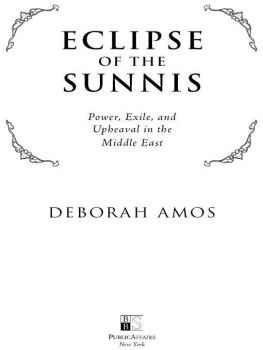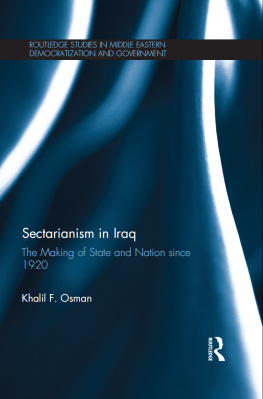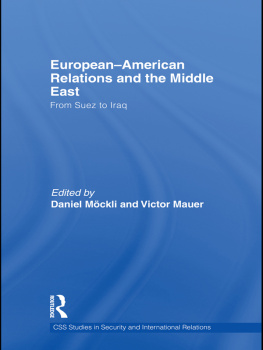TO R .C. DAVIS
INTRODUCTION
It was easy to believe, as we watched U.S. President Barack Hussein Obama stride across the stage at Cairo University on June 4, 2009, that a new era was about to begin between the United States and the Middle East. The campus was a symbolic backdrop. Founded in 1908 as a secular center of learning, the university serves as an intellectual bridge between East and West. The campus had boiled with anti-American sentiment during the U.S.-led invasion of Iraq, but on this day the keen anticipation was palpable as the audience waited for an American president to give what was expected to be a historic address to the Muslim world.
The presidents name alone had resonance: Some Cairo newspapers even went so far as to suggest that he was Americas first Muslim president, in keeping with the Arab tradition that a fathers religion is conferred upon the son. Of course, in American tradition, identity is a much more fluid concept. We wear our identities lightly, easily adding or shedding to suit the circumstances. So it was that an American president with a Muslim pedigree addressed the most deeply disruptive question of identity in the region where identity colors politics most. In his message to the faithful, President Obama exhorted that the fault lines must be closed among Muslims and he especially noted the fault lines between Shiite and Sunni, a historic chasm, often dormant, newly pried open by the U.S.-led war in Iraq. The divide that has seeped into the social fabric of the region is not principally about religion, but about power and the vacuum created when an American army toppled a Sunni tyrant. The immediate opportunity this offered to Iraqs Shiite community was well understood. Ever since the failure of the George H. W. Bush administration to support the Shiite rising against Saddam in 1991, Americans had recognized the potential for an alliance with the Shiite majority against Saddam. Excluded from U.S. thinking ahead of the war in 2003 was the ripple of consequences across all Sunni communities in the Middle East that Saddams removal would create. That is the subject of this book.
Closing the fault lines between Shiite and Sunni must begin in Iraq, but Mr. Obama hardly mentioned the place where the Sunni-Shiite divide is the most acute. Elsewhere, the signs in the region were much more uplifting: The Lebanese dented Hezbollahs popularity by voting for a publicly pro-American political coalition in a parliamentary election. Millions of Iranians bravely took to the streets to challenge the rigged election of a radical president. Syria celebrated the announcement of the return of an American ambassador after a four-year hiatus, a concrete sign that America was offering an open hand to adversaries. But the Iraqis were not yet part of the recovery. Despite an overall reduction in violence in Iraq, one statistic remains troubling and has barely changed. As of 2009, of the two million Iraqis who fled the country, only about 5 percent have returned. The fundamental problems that fueled the insurgency and the civil war are unresolved, as the exiles know all too well.
An estimated 60 percent of the refugees are Sunni Arabs. Fifteen percent are Iraqi Christians. Secular Shiites, Mandaeans, Yazidis, and Kurds are adrift, too, the losers in a brutal civil war that sealed the power of Shiite nationalists. Yet the sectarian nature of the crisis has been largely overlooked. This shifting population is a huge loss to Iraq, a vast problem to neighboring governments, a collective tragedy for many caught up in it, and a significant indicator of the health, stability, and viability of Iraq and the Middle East. The newly stateless have become the most important indicator of the next phase of the regions history. In their individual stories are found the religious, tribal, and sectarian challenges and conflicts that must somehow be settled for the violence to end.
While five million Iraqis had left or been driven out of Iraq during Saddams three decades in power, theirs was a slow-motion outflow of political dissidents. With the U.S. occupation, the collapse of the Iraqi state, and the violent power struggle that followed, almost as many millions were displaced in under five years, across borders and inside the country. The migration began as a trickle in 2004, when the driving force was criminal kidnapping gangs and Sunni insurgent attacks. The movement accelerated in 2006 with Al Qaedas bombing of the Golden Dome mosque in Samarra, Iraqan attack on a revered Shiite religious site that unleashed a wave of Shiite revenge attacks against Sunnis across the country. Displacements rose again through 2007 in a final spasm of sectarian cleansing even as 30,000 additional U.S. troops were deployed in Iraq.
The only way to explain the calamity was in the daily details, the particular threats that propelled the politics of displacement and made the bigger picture understandable. I began a journey to document the mass departure, traveling to Damascus, Amman, and Beirut to interview the growing exile population.
There are no camps of any kind in this latest wave of the dispossessed. The largest numbers quietly settled in the poor suburbs surrounding Arab capitals. I had seen them at the Baghdad airport in tearful good-bye embraces, well-dressed families struggling with luggage that was now the sum of their lives. Others drove west out of the capital along the desert road, the five hundred heartbreaking miles to Jordans border. When Jordan sealed the border against the human tide, the exodus turned north for the fourteen-hour drive to Syria. The Iraqi exiles brought money or gold, or relied on extended families to support what many believed would be a short stay until the storms of violence passed at home. They waited long past the time when the money ran out.
It was an exodus of the professional classdoctors, scientists, poets, professors, actors, even artisans, all of whom were the best hope to remake Iraq into the democratic and prosperous symbol of Americas most ambitious early dream. An unprecedented brain drain in the oil industry created an expertise deficit when more than half of the top one hundred managers fled. Iraqi government ministers began to complain of a shortage of workers able to write contracts. Scientists left the country, preferring unemployment in exile over joblessness and fear at home. The exodus continued down through the ranks of the middle class, including the workers in the vast government bureaucracy. By 2007, the overwhelming majority of exiles, more than 70 percent, were professionals and technocrats from Baghdad. Their departure crippled the government back home.









